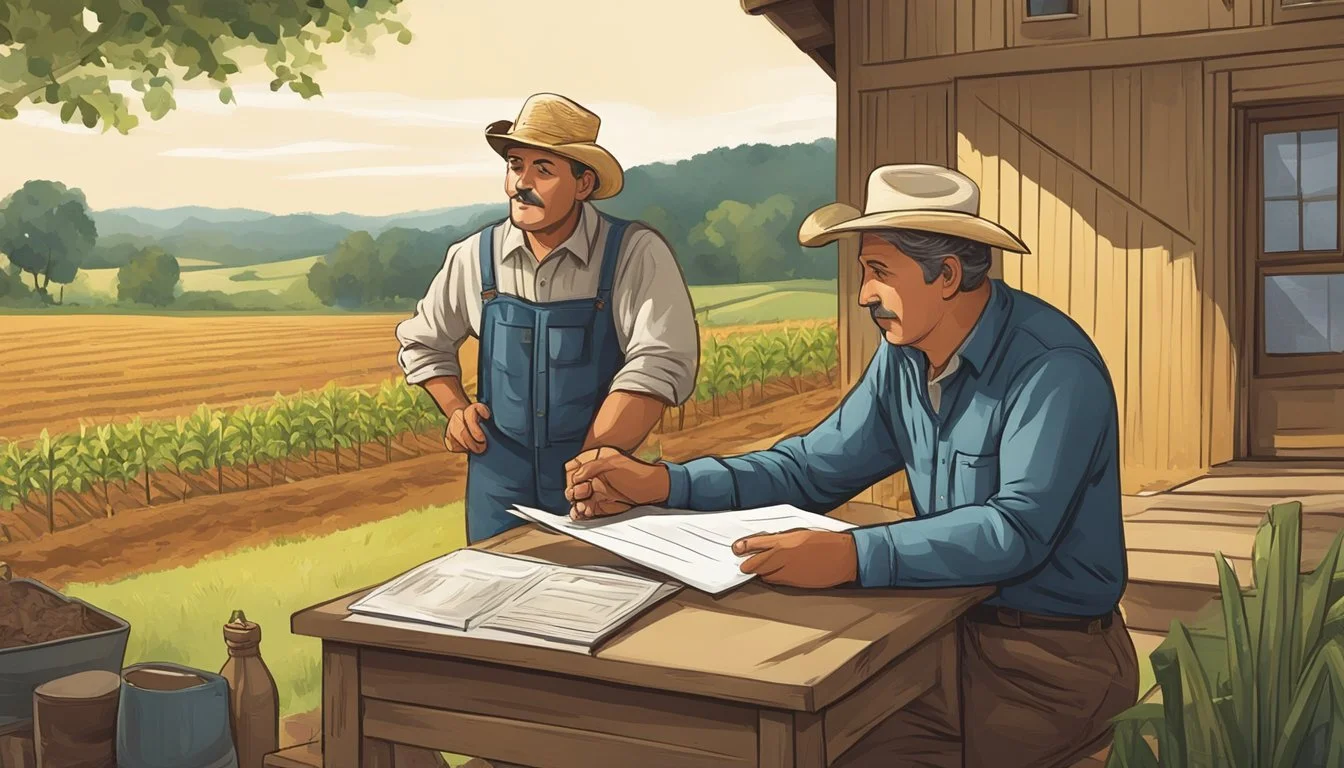Farm Loans in Indiana
Navigating Options and Opportunities
This Article is Part of Our Guide on Farm Loans for All 50 U.S. States
Agriculture remains a cornerstone of Indiana's economy, where a diverse range of crops and livestock are produced. To support this critical sector, various financial institutions, including governmental agencies and private lenders, offer farm loans catering to the needs of Indiana's agricultural community. These loans are designed to aid both underserved farmers and those just beginning their farming businesses, ensuring that the state's agricultural landscape continues to thrive.
In Indiana, farm loans play an essential role in enabling farmers to purchase land, invest in new equipment, and manage operational expenses. Specialized agricultural lenders like Farm Plus Financial and FarmBelt Financial provide tailored financing solutions, recognizing the unique challenges and opportunities present in the state’s farming industry. Similarly, organizations like the Farm Service Agency (FSA) under the USDA extend their support to targeted groups through direct and guaranteed loan programs.
The accessibility of these farm loans in Indiana contributes significantly to the agricultural sector's resilience. Farm Credit Mid-America and similar entities offer a spectrum of loan products that underpin the farmers' abilities to remain competitive and sustainable. Collectively, these financial services fortify the farming community’s position to navigate the evolving agricultural landscape while continuing to contribute to the state's and the nation's food systems.
Understanding Farm Loans in Indiana
With a variety of farm loans available, Indiana offers financial resources aimed at supporting the local agricultural community. These loans assist with operation costs, land acquisition, and expansion projects for farms of various sizes.
Types of Farm Loans
Indiana farmers have access to multiple loan options to suit different needs within the agricultural sector.
Direct Farm Operating Loans: For farmers to cover operating expenses such as seed, equipment, livestock, or farm-related costs.
Direct Farm Ownership Loans: Aimed at farmers looking to purchase or expand farm properties.
Guaranteed Operating/Ownership Loans: These loans involve a partnership with a commercial lender; the FSA guarantees the loan up to $2,236,000.
Eligibility Criteria for Borrowers
The eligibility for receiving farm loans in Indiana hinges on several criteria:
Applicant must be a working farmer with significant managerial experience.
Credit history is reviewed, ensuring the applicants can repay the loan.
There are specific loan programs for underserved applicants and beginning farmers—usually defined as those who have farmed for less than 10 years.
Importance of Credit in Farming
A farmer's credit history is crucial when applying for a farm loan in Indiana.
Strong credit demonstrates a farmer's ability to manage debt and increases the chances of loan approval.
Lenders evaluate past credit performance to predict future financial responsibility.
By understanding the various farm loans, eligibility requirements, and the importance of credit, Indiana farmers can navigate the financial landscape to support and grow their farming operations.
Programs for Indiana Farmers and Ranchers
Indiana offers a variety of farm loan programs aimed at supporting the state's farmers and ranchers. These programs are tailored to assist with financial needs, fostering growth and sustainability in the agricultural sector.
Loan Assistance for Beginning Farmers
Beginning Farmers in Indiana have access to operating loans that support various expenses related to farming ventures. These loans are designed to help them establish and sustain their agricultural businesses. The USDA Farm Service Agency (FSA) specifically provides ownership and operating loans with these young farmers in mind, focusing on those who are just starting their farming career.
Support for Non-Traditional and Specialty Operations
In Indiana, Non-Traditional and Specialty Operations, including livestock, honey bees, and farm-raised fish, can benefit from emergency assistance and other loan programs. The aim is to diversify operations and open new market opportunities. Key contacts such as Susan Houston and Samantha Garrison at the USDA Farm Service Agency in Indiana can provide specialized assistance in this realm.
Conservation and Environmental Stewardship
Farmers and ranchers are encouraged to partake in Environmental Stewardship and Conservation programs. These initiatives are integral to preserving the natural resources of Indiana's farmland. The USDA supports efforts through various programs, ensuring that sustainable practices are both incentivized and financially achievable for those in the agricultural sector.
Applying for Farm Loans
When farmers in Indiana seek financial assistance through loans, they should approach the process with a clear understanding of the requirements and the steps involved. Working closely with a farm loan specialist ensures proper documentation is gathered and eligibility criteria are met.
Understanding the Application Process
Farmers initiating the loan application process are advised to make use of the U.S. Department of Agriculture (USDA)'s online interactive guide, which is designed to streamline the application. The USDA's introduction of a paperless, online application system allows for features like an electronic signature and the ability to attach supporting documents directly.
Documentation and Requirements
The correctness of documentation is imperative for a successful application. Enlisted below are the typical documentation and requirements needed:
Proof of identity and legal farm operation status.
Details pertaining to farm size, type, and tenure.
Financial statements, including credit history and current farm operation balance sheets.
Loan eligibility necessitates compliance with the USDA definition of a beginning farmer—one who has not operated a farm or ranch for more than 10 years and who does not own a farm that exceeds 30 percent of the average county size, based on the most current Agriculture Census.
Working with a Farm Loan Officer
Applicants should seek out a farm loan officer, or a farm loan specialist, for guidance through the intricacies of the application process. These professionals provide valuable insights into the types of loans available, such as farm ownership loans, which can facilitate the purchase or expansion of a farm, or operating loans, which cover costs related to the day-to-day running of a farm operation. Loan officers can assist in evaluating eligibility, proposing optimal loan structures, and ensuring all paperwork is compliant with USDA regulations.
Financial Management and Repayment
Effective financial management and a clear understanding of repayment terms are essential for maintaining a healthy farm business in Indiana. Farmers must navigate through managing operating costs, securing favorable interest rates, and employing repayment strategies to ensure sustainability.
Managing Farm Operating Costs
Farmers are responsible for a wide range of operating costs, from seed and fertilizer to equipment and labor. Operating Loans can be obtained for these recurring expenses. Utilizing the USDA's resources, farmers may have opportunities to access enhanced management tools and services that can guide them through the efficient allocation and tracking of funds. Keeping operating costs in check is crucial to a farm's financial health, and thorough planning can prevent overextending financially.
Interest Rates and Loan Terms
The interest rates on farm loans can vary based on whether the farmer qualifies as an underserved or beginning farmer, and the type and term of the loan. Loan terms outline the repayment schedule along with the interest rate applied. Farmers should compare the terms from various lenders like FarmBelt Financial or The Farmers Bank to secure the most beneficial rates for their operations. An understanding of these rates and terms is fundamental for long-term financial planning and loan repayment.
Strategies for Successful Repayment
A farmer must employ robust strategies for loan repayment to ensure fiscal health and the ability to secure future financing. Here are some specific strategies for successful repayment:
Regular Review of Financial Statements: Monitoring financial performance allows for the early detection of issues.
Conservation of Capital: Reducing unnecessary expenditures can provide more funds for repayment.
Timely Payment Submission: With facilities like online payments through farmers.gov, punctual submissions can help maintain a good credit history.
Refinancing Opportunities: Reassessing loan terms during periods of lower interest rates can reduce overall costs.
Farmers in Indiana are encouraged to take advantage of both government and private sector resources to effectively manage and repay their loans.
Additional Financial Resources
In Indiana, farmers have access to a variety of financial resources beyond standard loans. These resources are particularly aimed at providing relief during emergencies and tapping into state and local programs tailored for farmers' specific needs.
Emergency and Disaster Relief Funding
For agricultural producers affected by natural disasters, the Emergency Loan program offers a lifeline. This funding is designed to help farmers restore or replace essential property, cover all or part of production costs associated with the disaster year, pay essential family living expenses, reorganize the farming operation, or refinance certain debts. The availability of this funding is contingent upon the area being officially declared a disaster area.
Eligibility: Farmers who have suffered losses caused by natural disasters.
Use of Funds: Restoration, living expenses, operational costs, or debt refinancing.
Exploring State and Local Programs
Farmers in Indiana can also explore various State Programs and Local Programs that provide additional financial support. These programs may have specific focuses, such as aiding beginning farmers or promoting sustainability, and are often tailored to meet the unique agricultural needs of the region.
State Programs: Include loan opportunities for beginning farmers and may offer favorable terms compared to conventional lenders.
Local Programs: Can vary widely but often include grants, training, or low-interest loan options to support local agricultural initiatives.
It's essential for farmers to research these programs thoroughly to understand the application process and how they can benefit from the available assistance.
USDA and Farm Service Agency Support
In Indiana, the USDA operates hand in hand with the Farm Service Agency to facilitate access to critical financial resources for farmers, particularly those just beginning their agricultural businesses or belonging to underserved groups. Through a variety of loan programs, these federal agencies ensure that farmers have the necessary funds to start, expand, or sustain their operations.
Direct Farm Loans from the FSA
The Farm Service Agency provides Direct Farm Loans which are a vital lifeline for new and existing farmers. These loans are designed to assist farmers in purchasing land, equipment, or livestock. Direct Farm Loans include both operating and farm ownership loans. For beginning farmers, specific provisions are in place to ease the initial financial burden, recognizing that the first decade can be the most challenging.
USDA Programs and Services
USDA Programs and Services are comprehensive and cater to a wide range of financial needs in the farming community. With a focus on beginning farmers and ranchers, the USDA endorses local support through teams and coordinators. The programs emphasize the support for underserved applicants, providing them with avenues to obtain FSA Loans when traditional commercial credit sources may not be available.
FSA Loans and Microloans
The FSA also offers Microloans, which are a subset of the agency's operating loans. These Microloans are tailor-made for smaller-scale farms, with a simplified application process. They are an accessible option for newcomers to farming and for smaller operations that may be overwhelmed by the more substantial traditional loans. Targeting farmers who may not meet commercial lender qualifications, FSA Guaranteed Farm Loans serve as a backup, with the USDA guaranteeing loans provided through local lenders.
Specialized Loan Products
In Indiana, specialized farm loan products cater to specific needs in the agricultural sector. These loans provide financial support for livestock and poultry operations, construction and improvement of farm buildings, as well as initiatives aimed at soil and water conservation.
Financing for Livestock and Poultry
Farmers can access loans designed to support the purchase, care, and feeding of livestock and poultry. These loans ensure that farmers have the capital necessary to sustain their herds and flocks, thus maintaining a crucial part of Indiana's agricultural output.
Livestock Loans: Offered to cover costs associated with purchasing and maintaining livestock.
Poultry Loans: Tailored for farmers specializing in poultry production, covering expenses from purchasing chicks to feed.
Loans for Constructing and Improving Farm Buildings
Constructing new farm buildings or improving existing structures is essential for modern farming operations. Loans are available to assist in financing these projects, which might include barns, storage silos, or greenhouses.
Construction Loans: For erecting new agricultural structures to enhance operation efficiency.
Improvement Loans: Aimed at upgrading existing farm buildings, to comply with safety standards and improve productivity.
Loans Aimed at Soil and Water Conservation
Protecting Indiana's natural resources is vital for sustainable farming. Loans that promote soil and water conservation practices allow farmers to implement measures that secure these resources for future generations.
Soil Conservation Loans: Facilitate actions to prevent erosion and enhance soil health.
Water Resource Loans: Support projects that conserve water, reduce runoff, and ensure water quality.
Educational and Youth Programs
The USDA Farm Service Agency (FSA) in Indiana extends its support to the younger generation through financing that encourages educational agricultural engagement. The Youth Loan program is specifically tailored to aid young individuals in establishing and managing agricultural projects.
Youth Loans for Educational Agricultural Projects
Youth Loans are an instrumental part of the FSA's mission to foster education and responsibility in agriculture amongst young people. Individuals aged 10 to 20 years may be eligible for loans up to $5,000. These funds are intended to support income-producing projects such as crop and livestock production.
Eligibility: Youth aged 10-20 years
Loan Purpose: Start-up and operational funds for agricultural projects
Maximum Loan Amount: $5,000
Project Requirement: Must be tied to the youth's involvement in agricultural organizations.
Involvement in FFA and 4-H Clubs
Participation in organizations like the Future Farmers of America (FFA) and 4-H clubs is a pre-requisite for accessing Youth Loans. The FFA and 4-H programs equip youth with hands-on experience in agriculture, providing a practical backdrop for the theoretical knowledge obtained from educational pursuits.
FFA: Offers a dynamic youth leadership development platform.
4-H Clubs: Focuses on personal growth and skills development in a community-based setting.
These organizations partner with the USDA to ensure that the funds are utilized for projects that advance the educational and agricultural acumen of young individuals. They serve as foundational pillars where younger members are both learning and directly applying agricultural skills in real-world scenarios.









